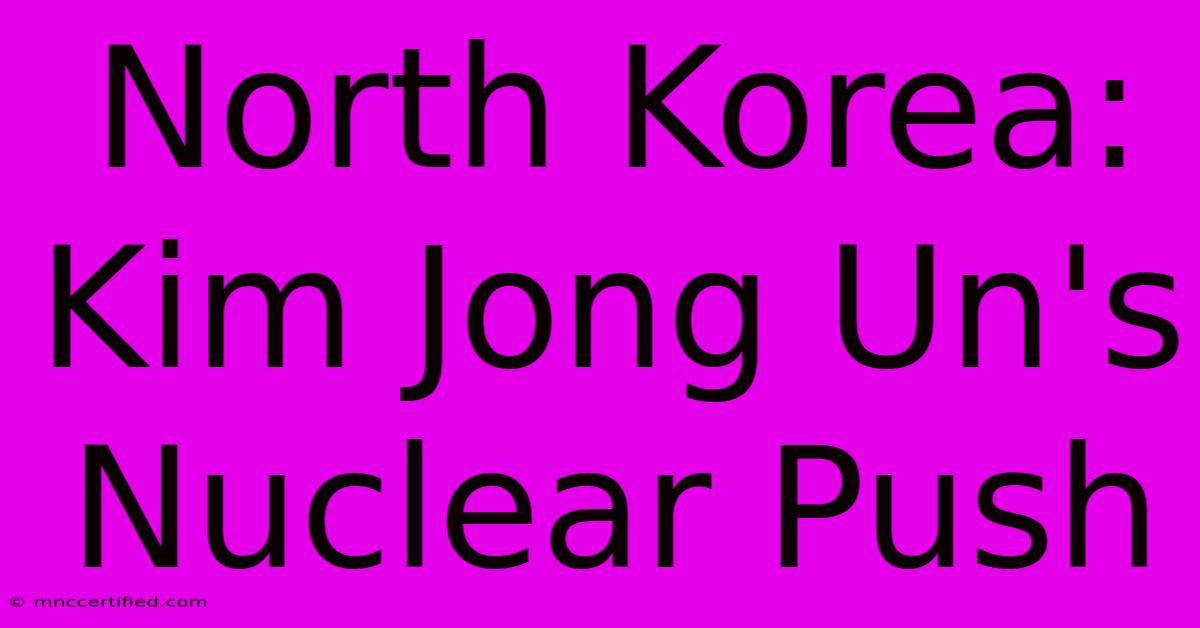North Korea: Kim Jong Un's Nuclear Push

Table of Contents
North Korea: Kim Jong Un's Nuclear Push and its Global Implications
North Korea's nuclear weapons program under Kim Jong Un has become a significant global concern, escalating tensions and prompting international efforts to curb its advancement. This article delves into the complexities of Kim Jong Un's nuclear ambitions, exploring the historical context, motivations, and international responses.
The Historical Context: A Legacy of Nuclear Aspiration
North Korea's pursuit of nuclear weapons is rooted in a complex interplay of historical factors. The Korean War (1950-1953) and the subsequent division of the Korean peninsula left a legacy of mistrust and insecurity. The perceived threat from the United States and its allies, coupled with a desire for regional dominance, fueled North Korea's determination to develop nuclear capabilities. Early attempts at nuclear development were clandestine, but the regime openly declared its intention to pursue nuclear weapons after withdrawing from the Nuclear Non-Proliferation Treaty (NPT) in 1993.
Key Milestones in North Korea's Nuclear Program:
- 1990s: Initial nuclear development efforts and the first nuclear crisis.
- 2006: First nuclear test, escalating international condemnation.
- 2009-2017: Several further nuclear tests and missile launches, defying UN sanctions.
- 2018-present: Periods of dialogue interspersed with renewed testing and military advancements, showcasing fluctuating geopolitical dynamics.
This timeline reveals a pattern of escalation, punctuated by periods of apparent de-escalation followed by renewed testing, making predicting future actions exceedingly challenging.
Kim Jong Un's Leadership and Nuclear Strategy
Kim Jong Un, succeeding his father Kim Jong-il in 2011, has aggressively pursued the nuclear program. His strategy appears multi-faceted:
- Deterrence: Nuclear weapons are seen as the ultimate deterrent against external aggression, particularly from the United States and South Korea. The regime believes that possessing nuclear capabilities ensures its survival and prevents regime change.
- National Pride: The development of nuclear weapons is presented as a symbol of national pride and self-reliance, showcasing North Korea's technological prowess despite international sanctions and isolation.
- Regional Power Projection: Nuclear weapons enhance North Korea's standing in the region, granting it greater leverage in negotiations and potentially influencing regional power dynamics.
These intertwined motivations explain the regime's persistent commitment to its nuclear program despite the considerable economic and diplomatic costs.
International Responses and Sanctions
The international community has responded to North Korea's nuclear ambitions with a range of measures, primarily focused on sanctions. The United Nations Security Council has imposed numerous resolutions aimed at restricting North Korea's access to materials and technology needed for its nuclear program. However, these sanctions have proven largely ineffective in halting the program's progress.
Challenges in Addressing the North Korean Nuclear Threat:
- Sanctions Evasion: North Korea has proven adept at evading sanctions through illicit trade and other means.
- Regional Dynamics: The complex geopolitical landscape, involving China, Russia, South Korea, Japan, and the United States, complicates coordinated international action.
- Lack of Trust: Deep-seated mistrust between North Korea and the international community hinders meaningful dialogue and negotiations.
The Future of North Korea's Nuclear Program: Uncertainties and Challenges
The future of North Korea's nuclear program remains deeply uncertain. While dialogue has occurred in the past, significant breakthroughs remain elusive. The regime's commitment to its nuclear arsenal appears unwavering, and the international community faces the continuing challenge of finding a viable solution to this complex issue.
Potential Pathways Forward:
- Renewed Diplomacy: Focused negotiations, involving incentives and concessions, could potentially lead to denuclearization.
- Strengthened Sanctions: While past efforts have fallen short, enhanced and more effectively enforced sanctions might hinder the program's advancement.
- Regional Cooperation: Greater collaboration among regional actors could strengthen the effectiveness of sanctions and promote dialogue.
The North Korean nuclear program presents a multifaceted challenge with significant implications for regional and global security. Addressing this challenge requires a nuanced understanding of the historical context, the regime's motivations, and the complexities of international relations. The path toward a resolution remains long and arduous, requiring sustained international efforts and a willingness to explore creative solutions. Only through sustained diplomacy and a collaborative approach can the international community hope to mitigate the risks associated with North Korea's nuclear ambitions.

Thank you for visiting our website wich cover about North Korea: Kim Jong Un's Nuclear Push. We hope the information provided has been useful to you. Feel free to contact us if you have any questions or need further assistance. See you next time and dont miss to bookmark.
Featured Posts
-
More Uk Snow Live Weather Update
Nov 19, 2024
-
Mewis Kerr Expecting Children
Nov 19, 2024
-
Gmail Might Add Temporary Email Addresses
Nov 19, 2024
-
Giants Bench Jones De Vito Takes Over
Nov 19, 2024
-
Japans Decade Long Economic Plan
Nov 19, 2024